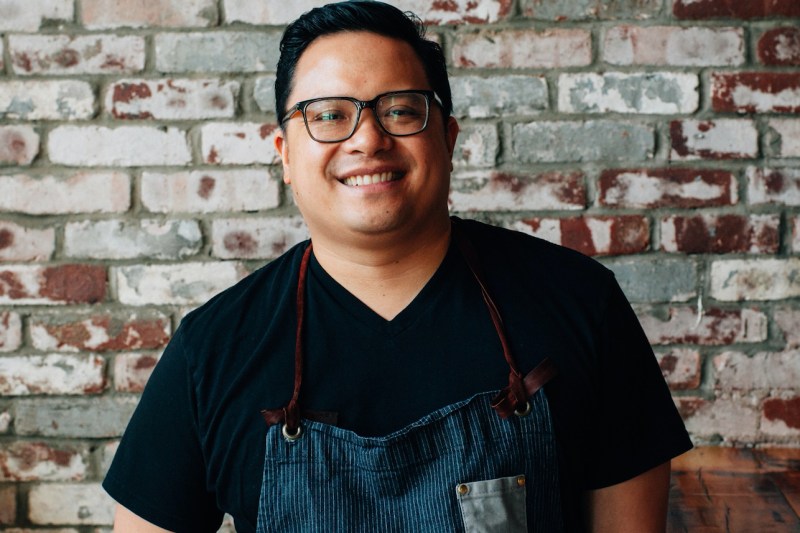
It’s a clear summer day when Dale Talde begins filming his new television series. Standing in a picturesque garden, Talde surveys his surroundings. On a table in front of him is an array of culinary tools and to his side, a quiet grill, soon to be alive with the smoke of charring meat. When filming begins, he speaks naturally, explaining every step of the recipe in an effortless manner. As a former Top Chef alum and guest on countless food television shows (Chopped and Iron Chef America), Talde is a seasoned television professional. Filming a cooking show is just another day at the office for Talde.
Related Guides
All of this is featured on Talde’s new television project, All Up In My Grill (premiered on Tastemade on June 30). The show has a singular focus but a status challenging thesis. While each episode centers on the art of flame grilling, it isn’t a typical grilling show. Talde’s goal is to showcase the diversity of the common backyard grill beyond the standard menu of hot dogs and barbecue chicken. The mission of the show is to make grilling seamless, creative, and fun.
“With a little bit of creativity and imagination and push, you can transform your outdoor grill into just another extension of your indoor kitchen,” said Talde. “Anything you use in your normal kitchen, you should be using as equipment for your grill. You know those giant barbecue tongs and giant barbecue spatulas? That stuff is all garbage. If you want to cook well, cook with what you normally cook with — your normal spatula, tongs. Obviously, it has to be heat resistant. But that’s all going to help you cook on a regular grill.”
As a three-time contestant on Top Chef and successful restauranteur, Talde has a lot of culinary knowledge to share about grilling. But there’s also something interesting about the food featured in his new show. On the first episode of All Up In My Grill, he demonstrates a unique twist to the crowd-pleasing rib rack by infusing it with sweet and aromatic Chinese Char Siu flavors. Even the sliders Talde makes feature the unconventional addition of a flavored mayonnaise rich with Korean kimchi.
This style of cultural mixing is the key to Talde’s eccentric cooking style. Much of Talde’s food featured on the show and in his restaurants are a blend of international cultures and ingredients. Although his cooking style is heavily connected to his Filipino American upbringing in Chicago, he is also a vocal advocate of change and looking at authenticity through the lens of lived experiences instead of strictly tradition. Perhaps the best representation of Talde’s food philosophy is his cookbook, Asian-American
“You can’t help but be influenced by what’s around you,” said Talde. “I live in Chicago and I love tacos. There’s a reason why I love tacos. First of all, everyone loves tacos, but second, there’s a huge Mexican population (in Chicago) and amazing Mexican food all the time. So that naturally influenced my palate because I grew up eating it.”

This challenge to tradition and mixing of global techniques and ingredients is being practiced by many modern Asian American chefs. Fusion can be a dirty word in the culinary world, conjuring up images of messy, convoluted pan-Asian food peddled by corporate chain restaurants or celebrity chefs. But for Talde, combining different cultures and traditions can be fantastic — it just needs to originate from a framework of respect.
“The French chef who’s an Asiaphile, who dates only Asian women and puts lemongrass on his beurre blanc and calls it Asian food, that’s bulls–t,” said Talde. “That’s not it. There’s a lot of white chefs who do Asian food that have a real respect for it. Andy Ricker, the guy’s an authority on Thai food, he has a real respect for it. But those other chefs who’ve seen it on TV, never traveled there, don’t have a respect for it, that put chili in their beurre blanc or other classic French sauces and call it Asian fusion, that’s not real. There’s zero respect in that.”
This idea of change championed by Talde is not without its critics in the community, particularly among some older Asian Americans. For those in the older generation, many of whom proudly hold onto the concept of tradition and authenticity, changing time-honored recipes can be seen as disrespectful. “It’s the aunties generation. They’re the ones who are like ‘hey, this isn’t real Filipino food.’ I never said it was. And I’m not really fully Filipino and even if I was, you have to adapt,” said Talde.
Talde represents a generational shift to the idea of being an Asian American. Many younger Asian American chefs and food media professionals, like Talde, are the sons and daughters of immigrants. While the formative years of their parents were spent in Asia, second-generation individuals like Talde grew up in America surrounded by different experiences and cultures. For younger Asian Americans, the idea of creating a new identity centered on being authentically Asian American cannot be done without profound innovation. While Talde’s parents didn’t grow up with Mexican tacos or McDonalds, he did, and that taste memory is a direct influence on his cooking. For this new generation of culinary talent, this push for new heights of creativity is simply the next stage of Asian American culture.
“A lot of us are turning into our late thirties and forties,” said Talde. “We should be doing the things that we are doing, becoming entrepreneurs starting our own businesses, writing cookbooks, becoming executive chefs. It’s just natural.



